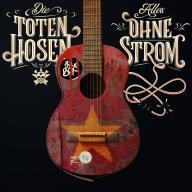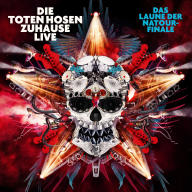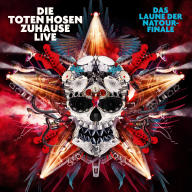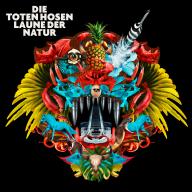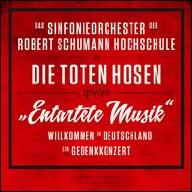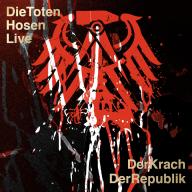For their next album, Die Toten Hosen released a two-disc set, with one disc of new material and a second featuring singles and rarities; 1990's 125 Jahre die Toten Hosen: Auf dem Kreuzzug ins Glück confirmed the success of Ein Kleines Bisschen Horrorschau was no fluke, topping the German charts not long after it was released. In 1991, the group released their first English-language album, Learning English: Lesson One, in which they covered songs by their favorite American and British punk bands, with members of the original acts sitting in as guests. (The album featured the final recordings of Johnny Thunders, who died weeks after adding solos to "Born to Lose.") The album also became their first American release when it was issued by Atlantic in 1994; oddly enough, that same year, the group cut another album of English-language material, Love, Peace Money, that was initially released in Japan. In late 1992, the group issued a single, "Sascha ...Ein Aufrechter Deutscher," which criticized the rise of extreme right-wing factions in Germany; while controversial, it was a hit that raised money for German anti-racist groups, and was a preview of Die Toten Hosen's most ambitious work to date, 1993's political concept album Kauf MICH! After extensive touring in 1993 and 1994 (including a handful of American dates opening for Green Day), and releasing a best-of collection, Reich Sexy, Die Toten Hosen took some time off, returning in 1996 with Opium Furs Volk, a collection of songs about religion, which was the band's first release on their own label, the newly formed JKP Records.
In 1997, Die Toten Hosen enjoyed a career milestone when they played their 1,000th concert. After releasing a Christmas album, Wir Warten Auf's Christkind, in the fall of 1998 under the alias Die Roten Rosen, the band returned under their own name a year later with Unsterblich, one of their most subdued efforts. Also in 1999, the group added a new drummer, Vom (b. Stephen George Ritchie, August 6, 1964), a British-born musician who became part of the group after Wölli was injured in an auto accident that made it difficult to play. The group also took another stab at the English-speaking market that year with Crash-Landing, a collection of the group's best tunes re-recorded with English lyrics. Die Toten Hosen were back to singing in German on 2002's Auswartsspiel, another hit that rose to the top of the German charts. The fall of 2004 brought the album Zurück zum Glück, and In Aller Stille followed in 2008. In the spring of 2012, Die Toten Hosen released Ballast der Republik, which brought their string of consecutive number one albums in Germany to five. It was reissued several months later with a bonus disc devoted to cover tunes. The band supported the album with a major concert tour, documented on the 2013 live album Live: Der Krach der Republik. In 2017, the band returned with their 16th studio long-player, Laune der Natur. ~ Mark Deming, Rovi


